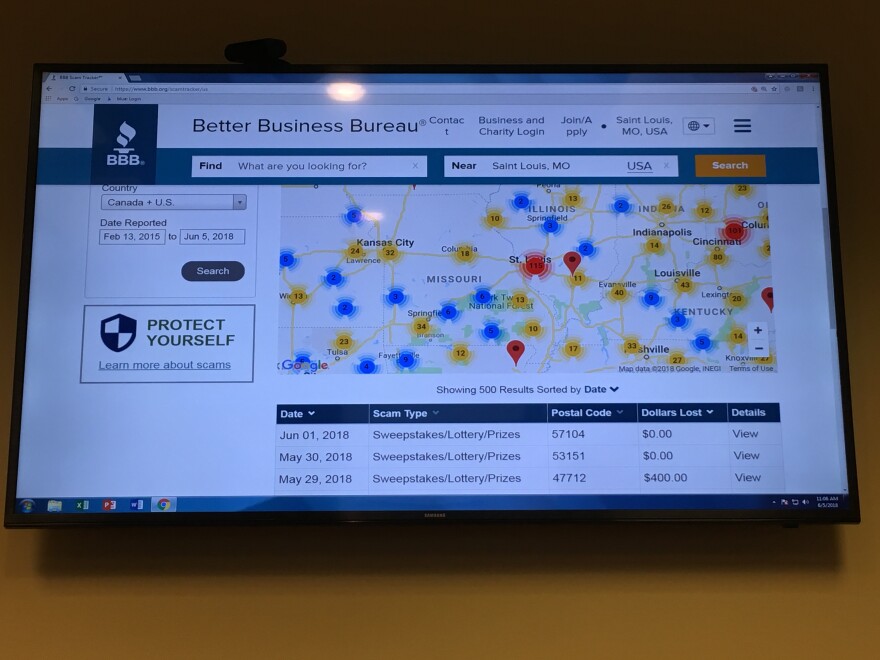The Better Business Bureau says scams involving fake sweepstakes and lotteries are on the rise in St. Louis and around the country. In a report released Tuesday, “Sweepstakes, Lottery and Prize Scams: A Better Business Bureau Study of How ‘Winners’ Lose Millions through an Evolving Fraud,” BBB highlighted the latest methods used by scammers to defraud unsuspecting victims.
According to the report, there is a large and sophisticated scam industry based in Jamaica, with a network of associates based in the U.S. and Canada. The networks use Facebook, text messages and other social media to target their victims.
More than half a million consumers in the U.S. and Canada lost $117 million to scammers last year. Federal Trade Commission studies have found less than 10 percent of fraud victims ever complain to the B.B.B. or law enforcement, meaning the actual level of fraud could be at least 10 times larger than these numbers reflect.
St. Louis B.B.B. president and CEO Michelle Corey believes many people are embarrassed to admit they have paid hundreds of dollars to scammers.
“Often people say, ‘I should have known better; I should have seen those red flags, my friends and family said don’t do it. But it was so convincing,’” Corey commented at a press conference to release the new study. “They wanted to win so bad that they let their guard down and became a victim of it.”
The B.B.B. estimates the majority of fraud victims are more than 50 years old. But new social-media techniques may be reaching younger audiences. According to the report, the FBI’s Internet Crime Complaint Center claims about one-third of the complaints it receives about sweepstakes/lottery fraud occur over social media. The B.B.B. receives many complaints from victims who were contacted through Facebook.
“Some fraudsters contact victims on their phones, using text messages or pop-ups on the phone browser claiming people have won large gift cards or new smartphones. The goal of this type of fraud is to gather information to sell to other scammers, and to get people enrolled in ‘free-trial’ offers,” said C. Steven Baker, B.B.B. International Investigations Specialist and author of the report.
Baker advises consumers to be skeptical and vigilant when it comes to calls or messages claiming you have won millions of dollars.
“Anybody that asks you to pay any money to anybody to get a prize is a crook,” he said. “I guarantee it.”
St. Louis B.B.B.’s Michelle Corey encourages consumers to report suspicious activity that may be linked to scammers, or if they have been a victim of a scam. She says reporting scams to local police, the attorney general’s office, the FBI and of course, the Better Business Bureau, can help authorities trace and prosecute perpetrators of the schemes.
“It’s important that you report it to us, so that we can warn others what’s trending in our region so that we can get some red flags out there to help other people,” Corey said.

To check the kind of scams reported in St. Louis and around the country, go to the Scam Tracker on the Better Business Bureau website.
BBB offers the following tips for consumers to avoid lottery or sweepstakes fraud:
- True lotteries or sweepstakes don’t ask for money before you claim a prize. If they want money for taxes, themselves, or a third party, they are most likely crooks.
- Call the lottery or sweepstakes company directly to see if you won. Publishers Clearing House (PCH) does have a sweepstakes but does not call people in advance to tell them they’ve won. Report PCH imposters to their hotline at 800-392-4190.
- Check to see if you won a lottery. Call the North American Association of State and Provincial Lotteries at 440-361-7962 or your local state-lottery agency.
- Do an internet search of the company, name or phone number of the person who contacted you.
- Law enforcement does not call to award prizes.
- Talk to a trusted family member or your bank. They may be able to help you stay in control of your money in the face of fraudster pressure.
Follow Melody on Twitter @melodybird



